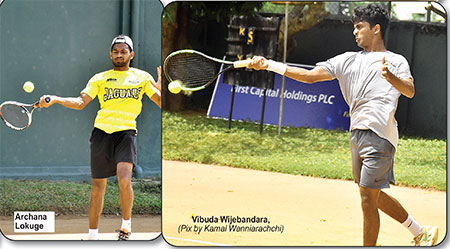Sports
Argentina creates History
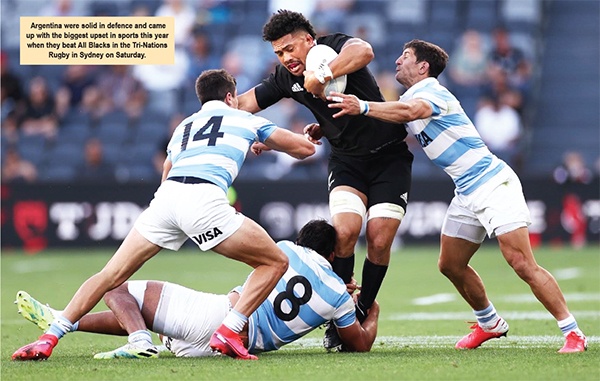
by Rajitha Ratwatte
Under 10,000 spectators at Bankwest stadium in Sydney. Argentina undercooked said the experts, they had not played as a team for 13 months (since the last World Cup) 12 players had caught the virus and even the coach had been a victim. Argentina would have watched the last game played by the Wallabies and also the world cup semi-final and learned that the All Blacks are beatable, if their plan ‘A’ is disrupted, they don’t seem to have a plan ‘B’. The general opinion of all the experts with the exception Andrew Mhertens, the former All Black no10 was that the All Blacks would win easily, and the reason was that Argentina hadn’t played for over a year. What about fresh legs, I thought to myself and doesn’t commitment and attitude have anything to do with it?
Argentina kicked off with Angus Gardiner refereeing. Right from the start it was obvious that the Argentina Pumas had come to play, and they meant business. A deliberate knock on by All Blacks no11 Caleb Clark in the second minute could have been yellow carded by a lesser referee, but a penalty was awarded instead. The Pumas no10 Sanchez tried an early drop goal in the third minute but missed. Argentina was giving no quarter and in fact they tackled relentlessly and gave no room for the All Blacks three-quarters to run with any room throughout the match. The rough house tactics paid off, a penalty was awarded against the All Blacks in the fourth minute on the 50-meter line right in front of the posts. No problem for Sanchez and the Pumas straight into a 0- 3 lead. Another deliberate knock on but this time well inside the Argentina territory was awarded just a penalty (no yellow card) and since it was right in front of the posts Ritchie Muanga kicked it over 3 – 3, 13th minute.
The rough house tactics and untidy play continued with penalties awarded willy-nilly. In the 18th minute an Argentinian attacking move resulted in a try and they were playing under a penalty advantage as well. As soon as the referee’s hand went out giving the penalty advantage, Sanchez the brilliant Puma stand-off, chip kicked over New Zealand line, picked the ball up and scored under the posts. No question of missing maximum points and the score 3 -10.
A penalty awarded to the All Blacks was reversed when their hooker slapped an Argentinian player right under the referee’s eyes! This reflected the extent to which the All Blacks had been rattled by the Argentinian tactics. Totally unprofessional behaviour from Dane Coles, of all people! Penalties were being milked by both sides, in the 14th minute Aaron Smith in the no 9 jersey for the All Blacks, deliberately passed the ball onto an Argentinian player who was trying to get onside, Argentina retaliated with a player running onto Jodie Barret of the All Blacks after a challenge in the air. Again, this second incident could have been escalated to a tackle without arms and even resulted in a red card, but good sense prevailed. Angus Gardiner is one of the better referees around, but I wish he wouldn’t try to tell the props how to bind in the front row. He has obviously never been anywhere near a front row when playing the game and theory alone, doesn’t suffice in the front row!
All Blacks’ mistakes continued and in the 25th minute another kick able penalty was awarded, mid-left around 32 meters out and Sanchez obliged 3 -13 to the Pumas. The intensity was such that Pablo Matera of the Pumas and Lennert – Brown of the All Blacks both went off for HIA checks in the 28th and 30th minutes. Lennert- Brown’s departure saw Ricco Ioane come on at center for the All Blacks much to my dismay.
It was proved to be a mistake with Ioane dropping a vital pass on a move that looked like a certain try at a crucial stage of the game. In the 36th minute, Argentina crossed the New Zealand line once more but desperate defence from Aaron Smith and Ritchie Muanga saved the day. It took 32 minutes before the first scrum was held and Argentina gained a very kick able penalty straight away, 3 – 16 to the Pumas. At this stage it was clear that the All Blacks were being upstaged by the sheer determination and commitment of the Pumas. It was only a question of if they could handle the pace of the game for the full 80 minutes. Half-time came with the Pumas leading by the same margin of 13 points.
The scrappy play continued as far as the All Blacks went but it seemed to be a carefully orchestrated plan by the Pumas. A penalty was awarded to Argentina 35 meters out and mid-left and the lead was extended, score reading 3 – 19.
The All Blacks started to bring on the bench in the 48th minute with Codie Taylor at hooker, Ricco Ioane (this time officially at center, he was on earlier briefly as Lennert- Brown went for a HIA) and Hoskins Sotutu in the third row.
In the 52nd minute, the All Blacks after two successive penalties scored far left. A straight throw to Aardie Savea standing at the front of the line out caught the Pumas defence napping and Sam Cane the All Blacks skipper scrambled over the line. Muanga converted brilliantly and the score was 10 -19. Ritchie Muanga was caught off-side in the 56th minute and the result penalty was converted by Sanchez 10 -22. More changes from the bench for the All Blacks, Brad Webber came on at half -back for Smith and Damien McKenzie for Goodhue. This was the point at which Ricco Ioane dropped the ball at center from a move that looked like certain points and would have made the margin much smaller and possibly even changed the result of the game. Ritchie Muanga joined in the mayhem and tried a chip kick that resulted in giving the ball straight back to a blue and white player.
In the 69th minute, a kick able penalty was awarded to New Zealand and this was the first sign of lack of on field thinking and ability to adapt showing its ugly face, something that has dogged the All Blacks in recent times. At this stage the on field thinkers, or ‘brains trust’ (yes, such things do exist in Rugby Union!) in the team should have realised that this game was no cake walk. The margin was such that multiple scoring was needed, three points should have been taken. However, a kick for touch was the preferred option.
Two more kick able penalties were also discarded for a scrum and a short tap respectively. Argentina’s defence was unyielding and of course in retrospect it was obvious that all kicks should have been taken to keep the margin at reasonable levels.
Hoskins Sotutu made a nice break from no 8 off an attacking scrum but threw the ball wide without running for the line. Argentina was dominating at this stage and turnovers in loose play were almost par for the course. A penalty against the All Blacks around 55 meters out, with the angle to the posts was kicked over by Sanchez and the score read 10 -25 and Argentina was poised on their first ever victory over the All Blacks in the history of the game.
The full-time hooter sounded and just afterwards, Caleb Clark scored his first try for the All Blacks after back to back penalties. A tough kick was missed by Muanga and the full-time score read 15 – 25, a historic win for Argentina, against all odds and thoroughly deserved.
One thing for sure, there is no such thing as an expert in the game of Rugby football. Undercooked they said, All Blacks to win by 40 points said John Kirwan, to use an Argentinian beef-based analogy, underdone they may have been but it was still a prime rib eye steak.
- News Advertiesment
See Kapruka’s top selling online shopping categories such as Toys, Grocery, Flowers, Birthday Cakes, Fruits, Chocolates, Clothing and Electronics. Also see Kapruka’s unique online services such as Money Remittence,News, Courier/Delivery, Food Delivery and over 700 top brands. Also get products from Amazon & Ebay via Kapruka Gloabal Shop into Sri Lanka.
Sports
Imran steals the show!

(This article by The Island’s respected cricket columnist Rohan Wijeyaratne first appeared in these pages 16 years ago; on the 11th of June 2005. As World Cup winning former captain and current Prime Minister of Pakistan Imran Khan has just visited the island, we reproduce this article in today’s edition)
In my youth – which is to say, quite a long time ago – I would often go to the YMCA canteen for a snack and a tea after whatever business that brought me to the Fort. Doing the same recently more for old times sake than anything else, I saw a familiar figure ahead of me heading in the same direction. Quickening my step and drawing abreast, I introduced myself to the gentleman concerned. He was none other than my old school English teacher, V. Thanabalasingham.
Not just a teacher, but an Institution
Those of you who may have passed through the portals of Ananda College during the 1960s and the early 70s and no doubt been well rounded in many ways, will admit to a man that when it came to the teaching of English, the name Thanabalasingham held no peer. In his prime, he was not just a brilliant teacher but an Institution. And volumes wouldn’t suffice to do him justice – such was the impact he made on all whom he touched, be it with the brilliance of Thackeray, Dickens, Chaucer or the Direct Method English Course that served as our bread and butter in English education at the time.
Another, from a different mould
Another teacher from an entirely different mould was Upali Ratnayake, now the Executive Director of CIMA. At the time he was introduced to us at the ‘A’ level stage, he appeared to our free spirits a cut above the rest. He acquired this status by doing exactly the opposite of what he was expected to do, which was to teach us English as a preparatory step towards an easier passage through University. Upali Ratnayake actually taught us nothing. Yet we learnt a good deal off him, discussing almost everything other than the subject he was paid for! His most endearing virtue was that he never spoke to us from a great height. And in that process, he taught us one of the most lasting lessons in life.
Several decades later, I nearly fell off my chair to receive a phone call from him inviting me to the BMICH on the 28th of May where Imran Khan and Kumar Sangakkara were due to speak at the CIMA Global Leaders Summit. The topics for discussion were “Passion for Perfection” and “Ordinary people in extraordinary acts.” The topics and the speakers seemed irresistible. And so I went.
What a speech!
I wasn’t disappointed. Neither were hundreds of others present. And predictably, Imran stole the show. Blessed with a presence that would have put any Grecian god to second class status, this tall, elegant and immensely handsome man spoke with such brilliance, clarity and articulation, the end result was as gripping as it was inspiring. In his wake, those who followed appeared cumbersome and dreary, almost like how Kenny Mackay would appear after the brilliance of a vintage Sobers or a Dexter! Kumar Sangakkara having to make do with less time than was his rightful share went largely unheard, tending to speak more to his fellow panelists than his audience. He will learn. As a probable hot contender to the top post after Atapattu, there will be many more occasions where he will be required to speak in public.
“Ambition must be upgraded, never downgraded”
Imran was of the view that all humans were endowed with limitless potential. Their limits if any, were often self imposed. Those who achieved extraordinary heights were those who dared to go beyond their self imposed limits. They thought big, dreamed big and did not allow their limitations to get in the way of achieving their dreams. He drew parallels from his own experiences in cricket, his cancer hospital project and his involvement in national politics to establish the point.
The four secrets
Starting with cricket, and drawing parallels with other legends including Zaheer Abbas, Imran stressed the need for a clear vision, the hunger to succeed, the willingness to sacrifice and self belief as being the four secrets to achieve one’s vision. Self belief was a factor which Abbas, despite all his God given gifts, had in very short supply. Imran, on the other hand, was full of it (sometimes foolishly!), because he never thought he ever could lose a game each time he stepped on to a cricket field. He gave many examples of it, including the victories against the might of the ‘invincible’ West Indians in 1986 against all odds. And that, despite having requested and got, ‘neutral’ umpires in a home series in Pakistan! He just wanted to make sure that when they won, there would be none to say that the umpires had anything to do with it!
Drawing from examples of his own life, Imran said that in all one’s life, one would hear others say why something cannot be done. That if accepted, would be the start of everyone’s downward spiral. Ambition he said, must be upgraded, never downgraded. And the more you pit your mind against the winds that resist you from reaching your ambition, the stronger your mind will become. Therefore, ambition must take precedence over everything. And towards achieving that, one should be willing to sacrifice anything. “Compromise” said Imran “for your vision, but never ever on your vision.” Great words!
Why the 3rd world is the 3rd world!
Relating what made him take to politics, Imran said that the problem with the third world was that the ruling elite would put itself above the law and deprive the ordinary folk of any justice. Hence his political movement was primarily meant to establish the rule of law in his country, where the weak and the strong were equal in the eyes of the law. “No society in the history of mankind has ever progressed without the rule of the law. The reason why the third world remained the third world was because it had very poor rule of the law. The elitist types did whatever they wished and got away with it, while the common man and the small and medium industrialist were all deprived of justice.” None could have spoken a truer word!
The ways of the mafia
Imran went on to say that when fighting for the rule of Law, one would be pitted against entrenched vested interests; the most powerful elite in the country. These were those who could buy justice. In Imran’s case, these were men who were also his good friends. Yet he preferred to take on the mantle of a social pariah instead, preferring to stand steadfast to his vision. The mafia usually reacts in such situations in either of two ways. They would either eliminate you or make you join the system. Just five months after his party was formed, he was offered 30 seats in Parliament out of 270. Imran refused, because he realized he had no chance of winning against entrenched political families that controlled his country. He knew the moment he joined them, he would need to compromise with his vision. So he refused, and got wiped out at the elections.
Refusing the Prime Ministership of Pakistan
When General Musharaff took over with Pakistan’s fourth military dictatorship in its brief history, he made all the right noises such as ridding the country of “sham” democracy and so on. No sooner Musharaff formed his own party, Imran was yet again invited, this time to become the Prime Minister of Pakistan. “But when I discovered that joining his coalition meant joining the biggest crooks in the country,” he had no difficulty in refusing. He was chided for his decision by many who argued that he could have joined and then fixed things up. But Imran said the decision was easy to make, as his vision was very clear. And it was one’s vision that decided when to compromise and when not to.
Imran’s vision
Imran’s vision was an independent and credible judicial system in Pakistan. So he asked himself the question, could General Musharaff afford an independent judiciary? The answer to him was obvious. If such a judicial system prevailed, most of the powerful men in his country would be tried for treason under article six of the country’s constitution. The sentence for treason was death. And he was therefore convinced that neither Musharaff, nor those around him could afford an independent and credible judicial system. And so, with his firm “No” Imran watched his party being destroyed yet again, to one seat, in parliament. This time it was by General Musharaff himself.
(To be continued tomorrow)
Sports
Spinners give India early advantage in third Test
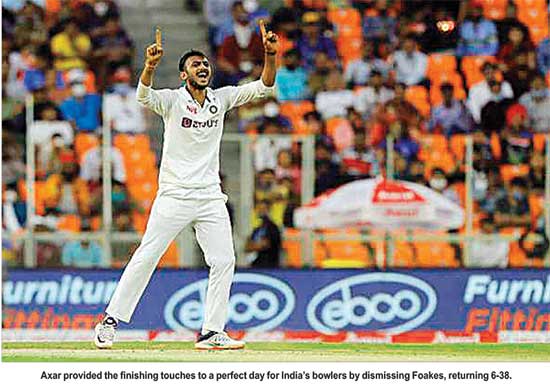
Indian spinners shot England out for just 112 inside two sessions with Ravichandran Ashwin and Axar Patel sharing the spoils after pacer Ishant Sharma opened the floodgates in his milestone 100th match on the opening day of the day-night third Test in Ahmedabad yesterday.
England were all out for 112 in 48.4 overs in the second session on a spin-friendly Motera pitch with Patel (21.4-6-38-6) grabbing his second five-for in his second Test while Ashwin (16-6-26-3) took three.
Openers Rohit Sharma (5) and Shubman Gill (0 ) negotiated five overs to take India to five for no loss at the dinner break.
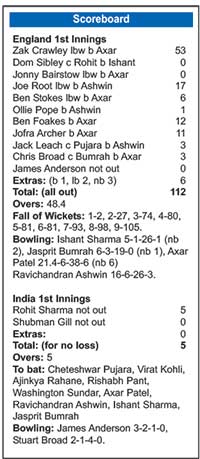 Gill, however, survived after TV umpire ruled him not out in the third over after England claimed for a catch.
Gill, however, survived after TV umpire ruled him not out in the third over after England claimed for a catch.
Ishant, only the second Indian fast bowler after Kapil Dev to play in 100 Tests, fittingly took India’s first wicket in the third over as he dismissed opener Dominic Sibley for nought.
Thereafter, it was all an Ashwin and Patel show as the duo bamboozled the England batsmen to complete the submission, except for the other opener Zak Crawley, who hit an eminently delectable half-century. Six English wickets fell in the second session.
England did not have any substantial partnership with the 47-run stand for the third wicket being the highest. They lost their last seven wickets for just 38 runs.
Crawley’s brilliance was, however, neutralised by the Indian spinners as England were left reeling at 81 for four going into tea after an exciting opening session in the pink ball Test.
Two wickets fell in as many overs after the resumption of the second session, with Ashwin and Patel taking one each, to reduce England to 81 for 6.
Ashwin sent Ollie Pope’s (1) off-stump cart-wheeling with a beauty of a delivery, bowling round the wicket, before Patel trapped Ben Stokes (6) LBW in the next over with a ball that spun in.
Jofra Archer (11) did a tad better as he hit a four in the second ball he faced and another boundary off Ashwin. But, Patel had him soon, cleaning up his off-stump to send England innings into a mess.
England’s rapid slide continued with Jack Leach edging one to the gully where Cheteshwar Pujara took a low catch off Ashwin, though the TV umpire took time to confirm the decision.
Crawley’s effort was the only silver lining for England. Having missed the first two Tests due to a freak wrist injury, the stylish right-hander’s driving was elegance personified as he hit ten boundaries during his 84-ball 53.
Sports
Top players secure third round places
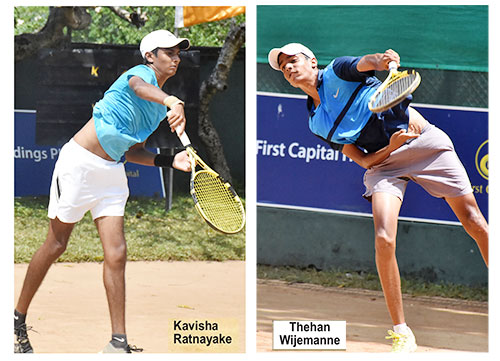
SSC Open Ranking Tennis
Thehan Wijemanne, Kavisha Ratnayake, Vibuda Wijebandara, Savith Weerasinghe, Kiran Viravanathan, Archana Lokuge advanced to the men’s singles third round at the SSC Open Ranking tennis tournament on Tuesday.
Some of the leading players fighting to improve on their impressive performances produced at the Tennis Nationals and the Colombo Championships during recent weeks knocked out their opponents easily to secure third round places.
